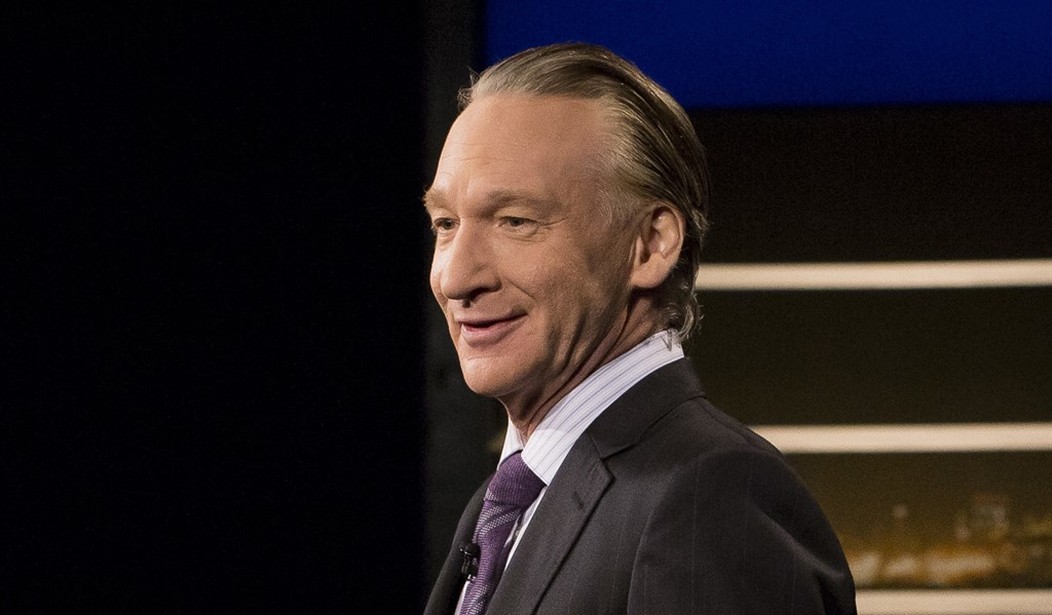Notable not so much due to its source as to its singularity.
Love him or hate him, agree or disagree, Bill Maher has always operated within reach of reality. His visit to the White House to meet with Donald Trump -- and his honest approach to it -- demonstrates Maher's ability to recognize when facts change and to adapt to them realistically.
Like many, Maher presumed that tariff fights would essentially replay the Smoot-Hawley playbook and land America and the world into a global depression. Unlike many, Maher recognizes that the trade deals Trump has inked essentially invalidated those concerns (slightly NSFW for language, via Twitchy):
🚨 WOW! Bill Maher admitted he was WRONG about Trump’s tariffs pic.twitter.com/BpGLBw7nEj
— Nick Sortor (@nicksortor) July 28, 2025
“The stock market is at an all time high!”
“I would have thought — and I gotta own it — that these tariffs were going to f***ing sink this economy by this time — and they didn’t”
“I don't…
Maher hedges his bets with "so far," a reasonable precaution, but makes it clear that the hysterics once again have been proven wrong. It turned out that our trading partners will pay a premium to access American markets and recognize that trade imbalances are legitimate issues. The Dow Jones Industrial Average has returned to and surpassed its February peak of this year; so have the S&P 500 and the NASDAQ indices. The Liberation Day losses have been erased, and investors are again bullish, at least for now.
I was also skeptical about tariffs, although hardly hysterical about their impact. Rather than expecting another Smoot-Hawley collapse, I expected more inflation and a general decline in consumer spending. I must also admit that those consequences have not happened, and I am happy to concede the point. Even as Trump kicked off the tariffs, though, I cautioned about making assumptions about the consequences and advised patience. We have always had some tariffs, as have our trading partners, so it's not a stunning change. We've tried free trade for decades and got played by trading partners for as long. Why not wait to see what Trump's policies produce before assuming the worst?
So I own my part, too, such as it was. Trump's strategy has been more successful than I predicted, and the negative consequences have not materialized. Now that Trump has signed deals firming up tariff rates, the chaos is over, and those negative consequences are unlikely to emerge. Furthermore, the strategic potential for projecting American economic strength as well as military strength is now apparent. So is Trump's acumen in trade talks, as the Europeans are now discovering to their embarrassment, via Power Line:
Trump has also inked tariff agreements with the UK, Vietnam, Indonesia and the Philippines, and talks with Beijing over a planned 40 per cent levy start in Sweden this week.
The US-EU truce in Scotland this weekend concludes months of fractious talks in which Brussels unsuccessfully tried to bring Trump back to a 10 per cent baseline tariff that the UK will be subject to. The two sides have still landed below a threatened 30 per cent tax that would have devastated export industries such as cars and pharmaceuticals. ...
Investors have taken far more comfort in the agreement than its signatories on the continent. France’s prime minister dubbed it a “submission”; Olivier Blanchard, a former official at the International Monetary Fund, called it a “defeat”, while Hungary’s Viktor Orban has used it to attack the European Commission for being “eaten for breakfast” by his ally, Trump. Orban copycat, the Alternative for Germany, called it a “slap in the face”.
What happened? The Times of London acknowledged that Trump exploited Europe's strategic weakness:
Investors have taken far more comfort in the agreement than its signatories on the continent. France’s prime minister dubbed it a “submission”; Olivier Blanchard, a former official at the International Monetary Fund, called it a “defeat”, while Hungary’s Viktor Orban has used it to attack the European Commission for being “eaten for breakfast” by his ally, Trump. Orban copycat, the Alternative for Germany, called it a “slap in the face”.
The Europeans are rightly lamenting their toothlessness in the talks.
Let's get back to Maher, and his singular (or nearly thus) admission of error. Not one other Trump critic has thus far made a public record of their error or even acknowledged that the stock markets never did give a hint of a crash, not even in the first few days after Liberation Day. Hardly anyone has recognized the strategic value of these trade agreements, even perhaps some of Trump's supporters on tariffs, but certainly not his critics. And the media coverage thus far today has been positively Eeyorish, lamenting that this was a least-bad scenario rather than a long-overdue corrective for the massive trade imbalances the US has floated for decades, not to mention a successful projection of American economic power that Trump clearly wants to use more prominently than military aggression to settle disputes.
Why not admit error, and acknowledge that Trump scored some real wins with trading partners that have exploited America's open markets in the past? To do that would validate Trump, and the TDS-suffering critics of Trump and the Protection Racket Media generally cannot abide that. They still want to run the Joe Biden/Kamala Harris disqualification campaign to undermine Trump's legitimacy, even after he won the election in November.
Reasonable people can disagree, and reasonable people admit to error. Maher's singular example demonstrates just how unreasonable the media and Democrat activists have become, and how reasonable the refusal of the public to put any trust in them actually is.








